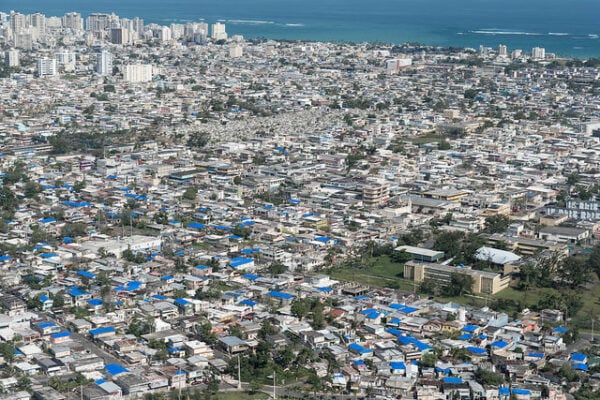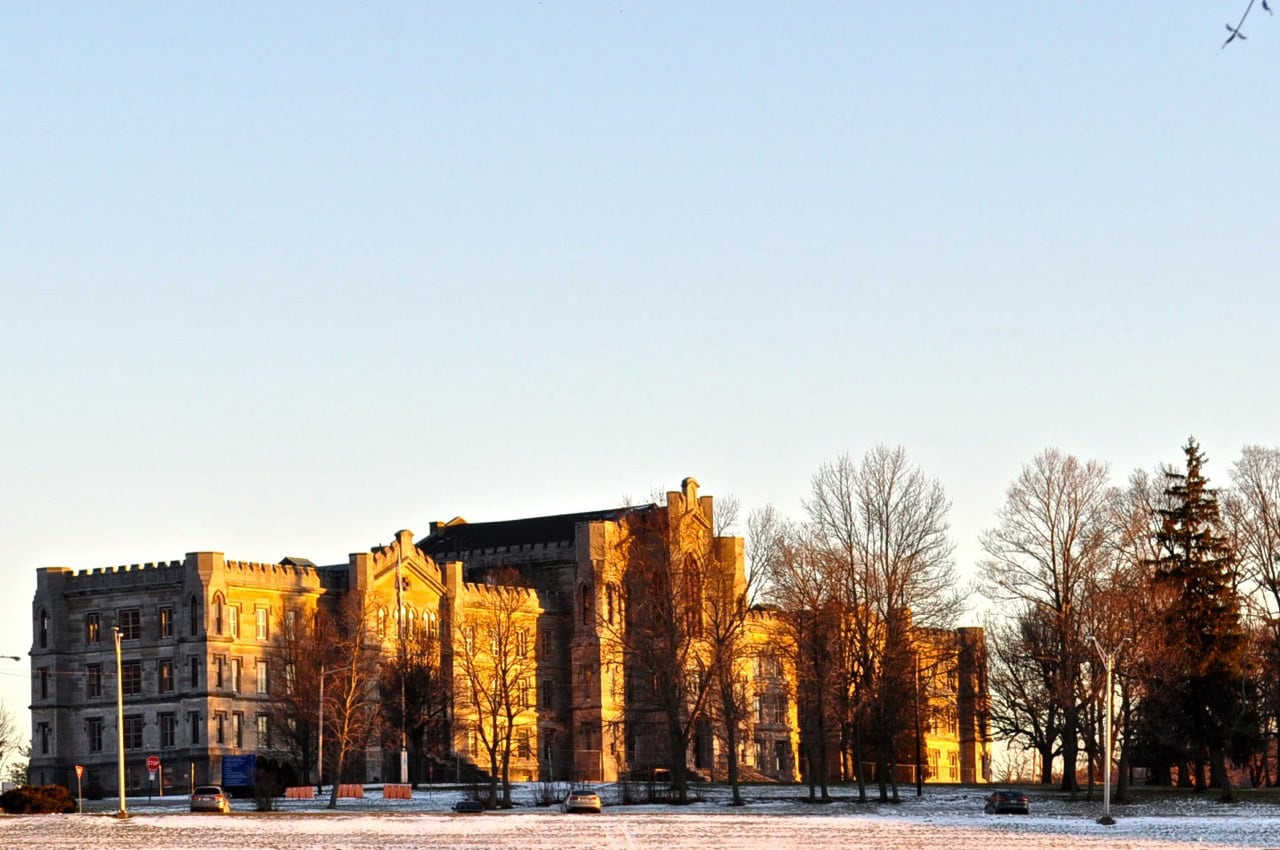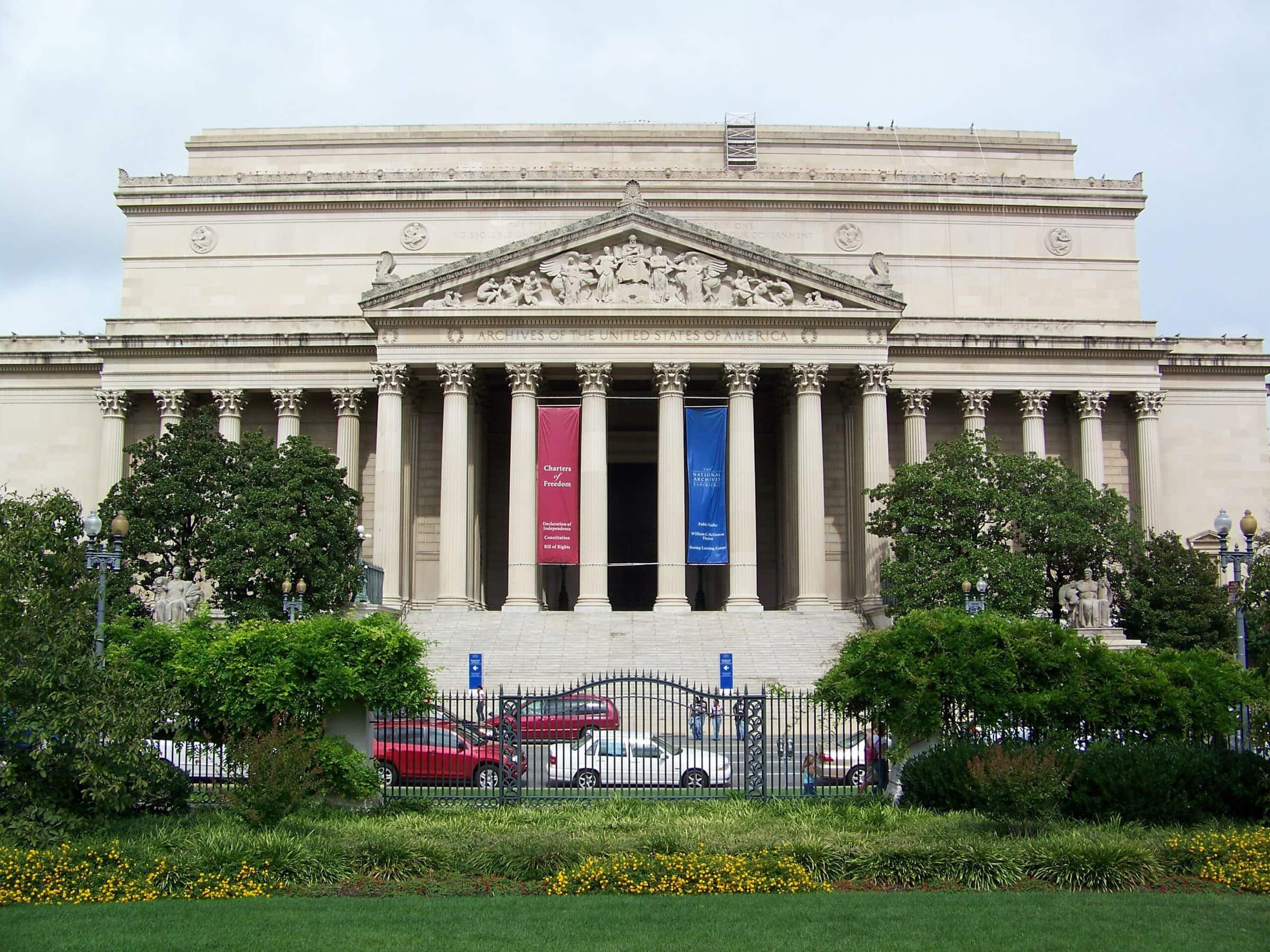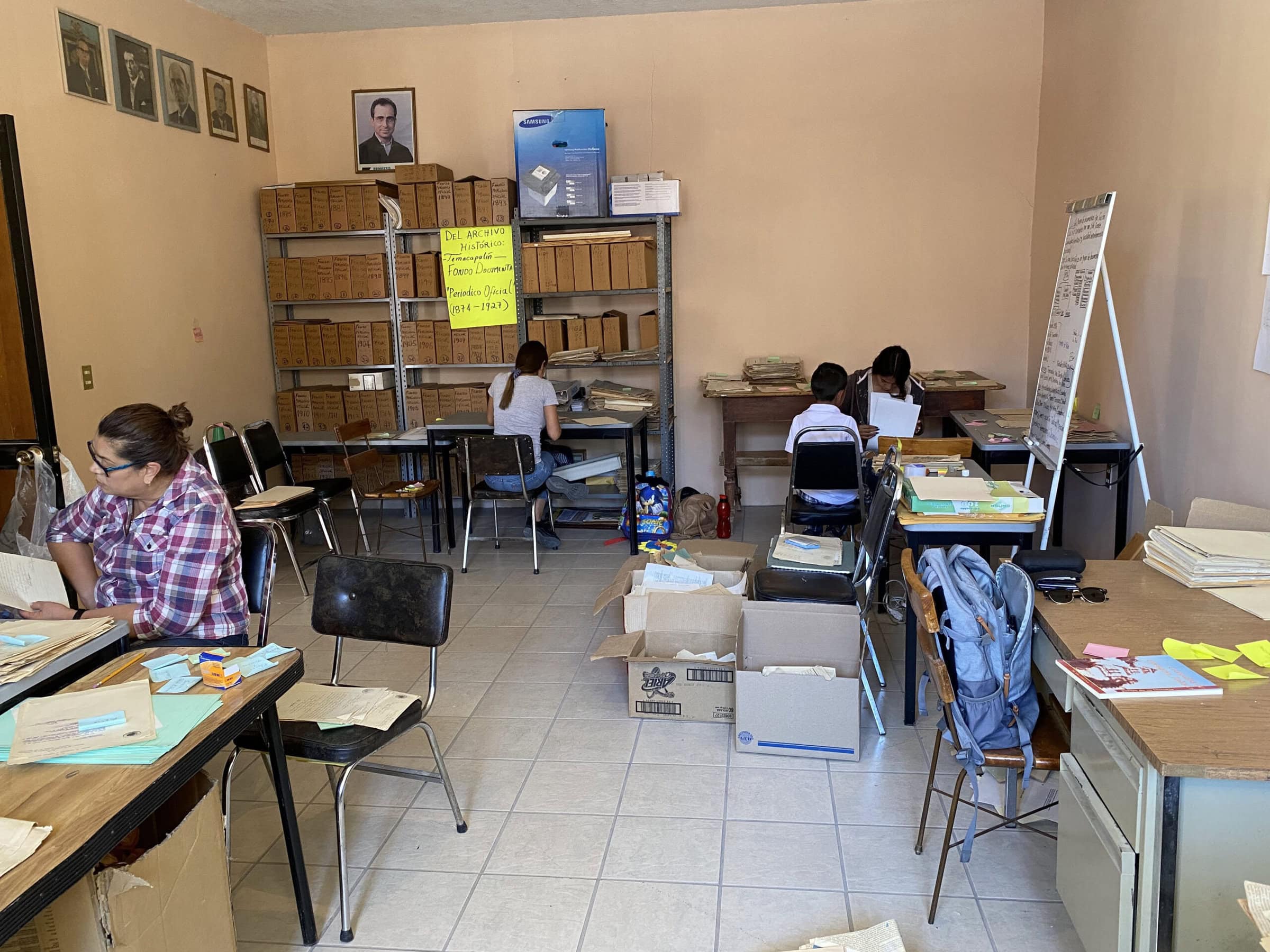On May 30, 2018, the New England Journal of Medicine reported that the aftermath of Hurricane María—a category 4 tropical cyclone that hit Puerto Rico on September 20, 2017—caused over 4,000 deaths on the island. In addition to the toll on human life, which many argue is still rising, the hurricane aggravated Puerto Rico’s ongoing economic crisis. With close to $72 billion in debt, the island is seeing rapid rise in unemployment, school closings, deterioration of its healthcare system and infrastructure, and mass migration to the US mainland. Indeed, the devastation in the wake of Hurricane María has left no part of the island untouched, not even the historical profession.

Blue tarps visible on the roofs of buildings in San Juan, Puerto Rico. The tarps were installed by the US Army Corp of Engineers as part of the Federal Emergency Management Agency’s (FEMA) program Operation Blue Roof. Lori Shaull/CC BY-SA 2.0/via Flickr
While conditions for historical production were dire before, the storm deteriorated them even further. Research facilities and libraries with meager resources faced flooded buildings and loss of power, putting collections and archives at risk. Research databases went offline, and scholars who have come to rely on steady access to power and the internet ran out of batteries and were left with patchy mobile hotspots. While conditions are slowly improving, they are far from what US mainland scholars take for granted. As the island’s academic landscape recovers, Puerto Rican scholars and students continue to face many roadblocks.
The University of Puerto Rico, Río Piedras (UPR-RP), both as an institution and as a community, particularly serves as a microcosm of the hardships island historians have been dealing with since Hurricane María’s passing. The largest campus on the island and in the UPR system, the UPR-RP holds rich archival collections and rare books crucial to researchers working on Puerto Rico and Caribbean-related projects. Almost all of my own sources, for example, are located at the UPR-RP, since my dissertation focuses on the history of its mid-20th-century student movement. Before María, the UPR-RP faced budget cuts, tuition hikes, and an overall deterioration of its campuses and services as part of the island’s overall austerity agenda. But since the hurricane, things have worsened.
Access to library resources at the university was extremely restricted in the aftermath of Hurricane María. The campus’ main library, the José M. Lázaro building, suffered grave damage, partially due to its crumbling 1954 infrastructure. Rooms flooded, and hazardous fungi enveloped the entire building. For almost four months, the library offered limited services in tents outside the building. Librarians risked their health by going inside to gather books for patrons. Students and researchers could not access uncirculated archival resources and were left without a study area. The building finally reopened in January—almost three months after the storm. Some materials, however, remain unavailable to researchers due to hazardous conditions. For instance, the Caribbean and Latin American Studies Library, housed within the Lázaro building, still offers limited services with a relocated staff because of dangers posed by its damaged air conditioning system. The Josefina del Toro Fulladosa Rare Books Collection is also in a similar condition. Other branches of the UPR-RP library system, such as its General Studies and Communications Libraries, remain closed to this day.
For almost four months, the main library of the University of Puerto Rico, Río Piedras, offered limited services in tents outside the building.
Since the storm, the UPR-RP has become a center for rich intellectual debate about Hurricane María’s effects on the island and its future, even though many conferences organized prior to the storm were cancelled and remain unscheduled. The UPR-RP’s Institute of Caribbean Studies recently invited both US and Antillean scholars to reflect on the impact of Hurricanes Irma and María on a wider regional scope. A session at the recently held meeting of the Latin American Studies Association (LASA) in Barcelona reunited a group of Puerto Rican graduate students who shared an intellectual project that they created during the UPR’s 2017 “Great Strike.” Their work fostered new discussions about the storm and beyond the meeting. In addition to research-focused reflections, the Río Piedras community has also seen a wide body of creative production. Esteemed Puerto Rican poet Mayra Santos-Febres for example, published poetry reflecting on the storm and guided her students to gather their own creations in another anthology.
But perhaps the factor that affected Puerto Rican historians the most was the eight-month closure of the island’s General Archive, which finally reopened on April 2018. The archive was facing severe budgetary and staffing issues before Hurricane María hit, but these generally did not impede research. After the storm hit, professors and students were unable to visit the archive at all. Carlos Ruiz, director of the Institute for Puerto Rican Culture, the government agency that administers the archive, was a teacher and PhD candidate in history before assuming his cabinet position. Yet he remained virtually silent about restricted access to the island’s most important collections. There have even been reports that several public documents were improperly destroyed at the agency post-María. Even though the General Archive is now open, several collections, mostly holding 20th-century documentation, remain unavailable because of damage to the building’s elevator.
In the wake of the storm, many professors and students had to come up with creative solutions to reduce their dependency on the libraries and archival materials located on the island. Some adjusted their topics to draw sources from smaller archives that suffered less damage and opened sooner. Others relied on online material. In general, because of limited resources for research travel, Puerto Rican scholars and students have traditionally turned to historicizing music, imagery, literature, performance, and architecture. María forced even more scholars to take innovative approaches to their primary source materials.
US mainland scholars must be cautious of researching Puerto Rico solely because it is trendy to do so after María.
Some researchers with internet access were able to continue their work post-María using online library resources from mainland institutions, but poor communication services made this impossible for many. The UPR-RP reestablished its wifi about three weeks after the storm but those commuting from suburban and/or rural areas had few options besides either working on campus or using their phones’ mobile hotspot if reception was stable enough where they lived. Internet access and overall communications have greatly improved since María, but service interruptions are more common than they were before the storm. The Río Piedras campus also suffers from occasional power outages.
Hurricane María led Puerto Ricans to reevaluate the island’s precarity and the privileges they had as a people. As historians actively researching in that context, most of us rarely thought about the privilege of having steady power to connect our computers or considered the steadiness of our internet connections that allowed us to find information within seconds or thought about how stable mobile phone receptions let us quickly set up meetings among our peers. The 2018 Atlantic hurricane season began on May 25, and a tropical system has already threatened the island, causing widespread collective anxiety. Island Puerto Ricans are aware of the infrastructural fragility that surrounds them, with María’s impact symbolized by the blue FEMA tarps still visible when flying into the San Juan Airport.
As Puerto Rican scholars adjust to their new circumstances, it behooves mainland scholars to keep up collaborative ties to the island’s academic institutions. They must also be cautious of researching Puerto Rico solely because it is trendy to do so after María. The storm and the island’s economic crisis are far from isolated phenomena. As historians, we should think about Puerto Rico in a more longue durée manner. The island as a case in and of itself and within other regional scopes, offers excellent opportunities for transnational and interdisciplinary research. With this in mind, my next post will address Puerto Rico’s economic crisis by using the UPR-RP as a lens into its longevity.
Aura S. Jirau is a PhD candidate in history at the University of Pittsburgh and winner of the 2018 AHA Summer Blog Contest. She holds an MA in history from the same institution and a BA in history of the Americas from the University of Puerto Rico, Rio Piedras. Her work’s main mission is to use the 20th century and the Cold War to frame Puerto Rico in transnational and global contexts. Her doctoral dissertation traces the mid-20th-century student movement of her undergraduate alma mater, and its relationships with both the island’s political struggles and its broader socioeconomic transformations. Currently, she researches this project full time on the island.
This work is licensed under a Creative Commons Attribution-NonCommercial-NoDerivatives 4.0 International License. Attribution must provide author name, article title, Perspectives on History, date of publication, and a link to this page. This license applies only to the article, not to text or images used here by permission.


